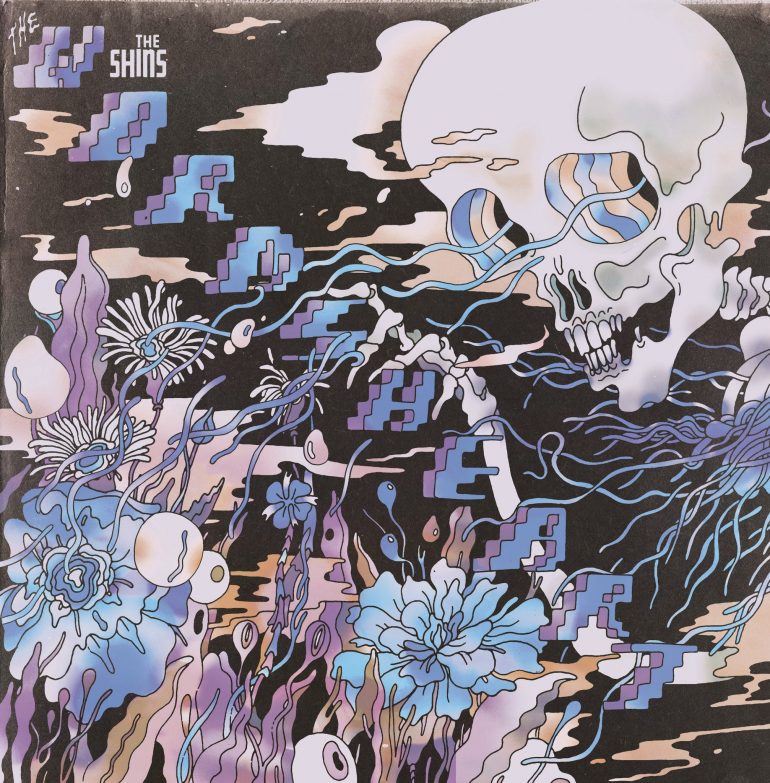Less than a year after releasing their fifth album, “Heartworms,” Portland-based indie rock band The Shins have returned with a new LP titled “The Worm’s Heart.” This album finds the band re-imagining (or “flipping,” to use their terminology) each track from “Heartworms.” The primary melody and lyrics remain in place, but nearly everything else has been rearranged and re-recorded, even lead singer/songwriter James Mercer’s vocals. Slower songs get an increase in tempo; electronic-infused tracks become instrumental, and vice versa.
The tracklist is also flipped, so the album begins where “Heartworms” ended, with “The Fear (Flipped)”—a catchy, psychedelic version of the original album’s swelling, emotional closer. Other tracks are given genre-bending instrumentals, with “Half a Million (Flipped)” gaining a reggae rhythm that serves as a fun gimmick but little else; title track “Heartworms” transforming into a more effective uptempo disco beat; and the country twang of “Mildenhall” replaced by an old-school rock n’ roll vibe.
While some songs on “The Worm’s Heart” serve simply as creative re-imaginings, others improve upon their original counterparts. Certain flipped arrangements breathe new life into some of “Heartworms’” weaker moments, such as “Fantasy Island,” “Cherry Hearts,” and “Rubber Ballz,” which are recreated with more effective instrumentals. The latter song gains a gentle beauty from its reserved recreation, and the melody of “Fantasy Island” is complimented by the increased momentum of the flipped version. “Cherry Hearts (Flipped)” is the album’s clear standout, elevating the peculiar electronic arrangement of the original into a rollicking jam that ranks among the best The Shins have put out in the last decade, while better showcasing Mercer’s songwriting.
At its core, “The Worm’s Heart” is indicative of the direction James Mercer has taken the band in since infamously firing his fellow band-mates following the band’s 2007 album, “Wincing the Night Away.” The Shins released their debut album 17 years ago, and many bands of such age eventually fall into a trap of attempting to recreate the sound and style of their early work, often unsuccessfully. “Heartworms” and “The Worm’s Heart” make it clear that Mercer intends to forge his own path.
Mercer, now 47, has instead embraced entering the later stage of his career, opting to further experiment stylistically, hone the pop sensibilities of his songwriting, and use his shifting perspective to inform his lyrics. The Shins’ 2012 album “Port of Morrow” found Mercer gathering a variety of new collaborators to craft an eclectic sonic palette, while trading the structural experimentation of previous efforts for more straightforward songwriting.
Mercer doubled down on “Heartworms” and “The Worm’s Heart,” with a significant number of upbeat pop hooks filling out a musically disparate group of songs that were recorded and produced by Mercer himself. Such choices preserve a sense of energy and enthusiasm often lost in the later stages of aging bands’ discographies, but the creative variety comes at the cost of the stylistic consistency that defined The Shins’ earlier albums. In addition to the band’s musical choices, a core element that makes both versions of these tracks successful is the way Mercer’s recent output has embraced his changing point of view.
Mercer began to incorporate themes of fatherhood, marriage, and aging on 2012’s “Port of Morrow.” Musicians often try to obscure their middle age from their songwriting, appearing ambiguous in an attempt to maintain relevance; Mercer embraces his place in life. “The Worm’s Heart” finds him grappling with one’s place in the world and the ever-growing portion of one’s life that becomes the past, alongside references to parenthood and mature adult relationships. Age begins to reveal answers to some of life’s questions, but others still remain elusive.
On “The Worm’s Heart,” Mercer’s songwriting is frequently looking back and reflecting on his past. Over the pulsing, synth-y rhythm of “So Now What” he reflects on his youthful preconceptions of life, singing, “I had this crazy idea / somehow we’d coast to the end / change lies in every direction / so now, I guess we’ll just begin again.” When he expresses self-doubt on “The Fear,” an album highlight on both versions, he speaks from the perspective of someone with newfound awareness, singing, “I feel fear / of all the stupid things a man could feel / While his freedom rings he squanders the deal / What am I, blind? What took me this long?” Mercer continues reflecting on his past self on “Heartworms,” an ode to a lost love: “I found the postcard from that trip you took to Thailand / I remember studyin’ all the words written in your pretty hand / The little lines and little curves that held a sacred meaning / or so I thought, but I had it wrong.”
Even as he is looking backward, Mercer conveys a sense of acceptance. Through this growing inner peace he captures the confidence and identity that comes with growing older. “He can whine about different times / but me, I’m fine with the mirrors far away,” he sings on “Dead Alive.” Acceptance is a significant recurring theme, which he continues on “So Now What:” “It’s sort of an unspoken rule / that things will not turn out the way you plan / You know that I, I can handle all of that, if I can still take your hand.”
Mercer is no longer the disillusioned young man from Albuquerque singing “I’m looking in on the good life I might be due never to find” on “New Slang;” rather he is now singing from a place of empathy and experience to others who may still feel that way. In the empowering “Name for You,” written in part for Mercer’s daughters, he refutes “..somebody with an antique notion” of womanhood, warning, “They’re just afraid of you speaking your mind / They’ve got a name for you girls. / What’s in a name?” “The Worm’s Heart” continues to discredit the opinions of others on “Half a Million,” one of Mercer’s catchiest songs to date, singing, “There’s half a million things that you’re supposed to be / …As crazy as it seems, you give it up and you are free.” That Mercer is able to so efficiently weave these themes into catchy, musically complex tunes is a testament to his talent and oft-overlooked pop sensibilities.
While some flipped versions work better than others, “The Worm’s Heart” remains a unique, engaging undertaking. It would be fascinating to see other artists attempt such a format; but for The Shins specifically, this pairing of creative experimentation with Mercer’s maturing songwriting works to keep Mercer firmly in the present, looking back only to reflect on how far he’s come.
This article originally appeared in the print edition of our February 2018, issue.





